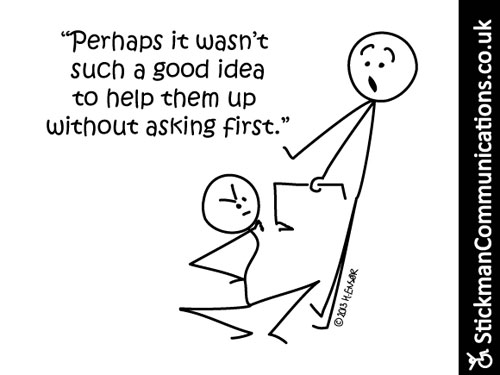
Emma tests a new prototype app that lets blind people find other blind people.
“We’d arranged to meet at a shopping mall but, as time went by, I began to wonder why my wife was so late,” says Doug Wakefield, one half of a married blind couple visiting the CSUN accessible technology conference in San Diego last week.
His wife Judy picks up the story: “Eventually, someone came up to me and said, are you waiting for a man with a guide dog?
“We were to meet at the main entrance but I was to the left of the door and Doug was standing to the right, only ten feet away.”
Lots of blind people have blind friends, so This game of cat and mouse takes place regularly. It can be funny but it’s certainly a little frustrating.
As smart phones are fast becoming a basic part of a blind person’s toolkit, it’s perhaps not surprising that someone has now created “an app for that”.
People Finder has a very basic but accessible interface. Like mainstream products with similar aims, such as Grindr for the gay community and Spotme for networking at conferences, you have to have the app running if you want to meet up with people in your circle.
It alerts a user, via a vibration and a noise, when someone else with the app comes within 50 feet. It uses Bluetooth to detect people.
As you search for your friend, the app will let you know how close you are, by saying “near” or “cold” as you walk around.
To aid social niceties, There’s the option to message the person through the app to say you’ve clocked them, before descending on them.
Mike May is The brains behind People Finder, which is being developed by his company Sendero Group. They have 13 years experience of making accessible satnav solutions for blind pedestrians but Mike says he has wanted to make a people finding app for a long time.
“As a blind person I’d love to be made aware of when somebody I know is near by, so that I can meet with them,” he says. “As a bonus, you will also be careful not to talk about someone if you know they might be in hearing distance.”
Another attendee of the CSUN conference is Julian Vargas from California. He hopes to test out the app on a local bus route to see if he can spot the bus his friend is already on, so they can travel together. His friend can’t see to wave to him through the window and so it’s very easy to get on the wrong one, alone.
“The way we tend to do it now,” says Julian, “is by sending text messages. This app would be nice because if my friends are running it, when their bus pulls up, theoretically, all of a sudden my phone should ding and say that it sees their phone.”
Blind people already have a range of strategies for letting a sightless friend know they are nearby. The best way is to use your voice so your friend can hear you but, socially speaking, it looks a little odd just talking to yourself so blind people might pretend to be having a phone conversation or pet their guide dogs saying “good boy Buttons” a little more loudly than usual.
It may have crossed your mind that there might be a big security risk with having already vulnerable people announcing themselves digitally over the air so others can find them. Some apps of the people-finding variety have caused concern but the dynamics seem a bit different here. Potential sighted stalkers can already see blind people at 50 feet, and are likely to know they can’t see if they’re using a dog, a white cane or that they’re not negotiating obstacles very elegantly, so the app isn’t going to betray them any more than normal in most circumstances. Blind users may consider this an acceptable risk if it means that they too can spot their pals.
One hundred people are currently testing the prototype app, which can be used indoors or outdoors wherever you are in the world. Mike May is having trouble getting funders to see why blind people would need it and wants all current testers to form a “fan club” to raise its profile.
Now for a blind access app that keeps track of your children in crowded shopping malls, a GPS app which is accurate to within 1 CM and perhaps, one that
can plot a direct route into the arms of a soulmate.
SOURCE: BBC Ouch Blog – Read entire story here.


